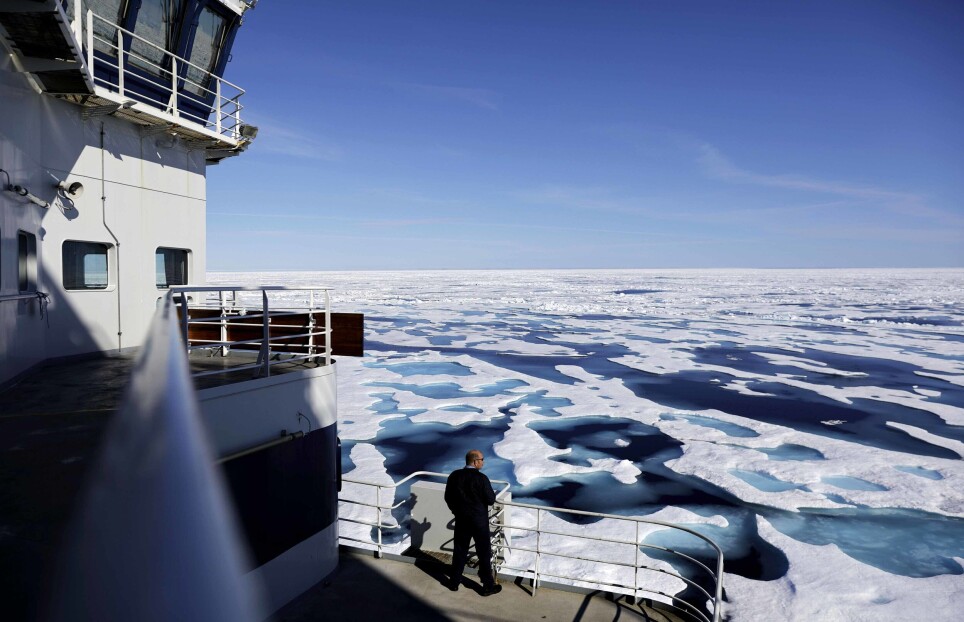THIS ARTICLE/PRESS RELEASE IS PAID FOR AND PRESENTED BY NUPI, Norwegian Institute of International Affairs - read more

Reduced influence in the Arctic?
In the Arctic Council, eight states work on, among several other pressing issues, the alarming impacts of global climate change. But who gets a say? Research Professor Elana Wilson Rowe investigates this in a new article.
The Arctic is warming at three times the average global rate of warming. Eight states work on, among several other pressing issues, the alarming impacts of climate changes in the Arctic Council. A number of states and peoples have a stake in the Arctic ecosystems and work across national borders to protect vulnerable nature and pursue commercial interests, such as shipping and fisheries. Border-crossing concerns like these have pushed a cooperative approach to certain Arctic governance issues for decades.
The Arctic is not the only ‘ecoregion’ that sits at the crossroads of national borders. 132 of the world’s terrestrial ecoregions and marine provinces are situated in complex political terrain, with four or more adjacent countries. Almost one third of these have governance institutions or efforts anchored specifically in these ecosystems themselves.
So, why do states and other political actors chose to govern an ecoregion cooperative or govern with a border-crossing ecosystem as a justifying factor? Who gets to influence such governance processes? And what consequences does this type of governance have for global politics more generally?
With the Arctic as the point of departure, Research Professor Elana Wilson Rowe (NUPI) examines these questions in the open access article Ecosystemic politics: Analyzing the consequences of speaking for adjacent nature on the global stage, published in the most recent issue of Political Geography. The article is the first from the research project LORAX, which is funded by the ERC.
Who gets to care?
“An interesting finding of the article is that despite the increase in the number of non-Arctic actors in Arctic Council proceedings, if we look at how they participate – not just presence – we see something curious. Despite the increase in global attention to the Arctic region – partly triggered by the historic Arctic sea ice low of 2007 – non-Arctic actors have become gradually less central diplomatically,” says Rowe.
According to her, we are now entering an era of politics in which the natural world comes out of the realm of ‘just environmental management’ and may structure more of how the global business of politics is done.
“Therefore, it is important to be aware of how new sources of influence – for example, being adjacent to rather than distant from a globally significant ecocystem – are going to matter. Who gets to care about and have a say over big ecoregions – like the Arctic, the Amazon, or the high seas?” asks Rowe.
Has united the Arctic states
The relationship between the Arctic and non-Arctic states has changed through the course of the past 20 years.
The world’s attention towards the Arctic has increased. However, according to Rowe’s article, non-Arctic actors have gradually become less influential in the region’s most important meeting place – the Arctic Council. At the same time, several forums have emerged where Arctic policy can be put on the agenda, such as multilateral organizations. This means that non-Arctic states may also choose to address issues in these organizations. In other words, Arctic policymaking has become more complex during the past 20 years.
“So, for example, that the EU Parliament or China have previously hinted at or presented the Arctic as an ungoverned area or global commons. Responding to this potential understanding of the region is something that really united the Arctic states in ‘speaking for’ the Arctic collectively. The Arctic states work together to underline to the governed nature of the region and the prominent role of coastal states in international law,” says Rowe.
Who leads, who participates and what is considered acceptable?
Rowe presents a framework for analyzing the consequences of ‘speaking for’ border-crossing ecosystems in her article, based in three key analytical angles:
- Networks (what are the relationships shaping the field?)
- Hierarchies (who leads and how does leadership work?)
- Norms for political behaviour
“Environmental cooperation is most frequently seen as low-level politics - and, unsurprisingly, is a popular option for ‘Track II’ contact between states that have difficult relations on other fronts. Yet, in the Arctic, this environmental cooperation has had consequences for hierarchies around the region, for example, Arctic/non-Arctic actors or Arctic coastal states/Arctic states more generally. These hierarchies, in turn, have broader security, political and diplomatic significance,” Rowe explains.
Even more important during times of political unrest
There have been several key drivers for Arctic governance, for instance, the activism of circumpolar Indigenous people and environmental cooperation.
“Some of the earliest forms of circumpolar cooperation were rooted in coming to terms with the interlinked ecosystem(s) of the region, scientifically or in practical management,” explains Rowe.
She adds:
“Working on shared issues relating to the social and environmental and natural conditions of the region are definitely the core focus, yet we have also seen that the Arctic Council has been a meeting place that has generating more binding international agreements, for example about search and rescue or about how to manage the prospect of commercial fisheries in the Central Arctic Ocean as sea ice retreats due to climate change.”
However, according to Rowe, one could say that cooperation retreats to these safer, core issues when the broader political climate is difficult between the Arctic states, as it has been since the annexation of Crimea and the implementation of a sanctions regime against Russia.
“Around the Arctic Council, you also have these longstanding policy networks between Indigenous peoples’ organizations and their political and expert representatives, scientists and other related experts. These have been an important source of stability and progress throughout the Arctic Council’s history, and perhaps play an even bigger role when there are rough geopolitical winds.”
‘Much hope’
Rowe highlights the importance of better understanding the ‘additional effects’ of cooperation based in ecosystems in the future:
“We face big, global environmental challenges - like climate change and waning biodiversity - and we also look to the environment to provide for more of our needs to achieve a more equitable and safe world. Most of these challenges are often seen as almost unresolvable on a global level, but there is a lot of hope for what the regional level might offer as a location of environment-society governance beyond the nation-state. So, we need to understand much better what the consequences of such regionalization of global aims and challenges are.”
Reference:
Elana Wilson Rowe: Ecosystemic politics: Analyzing the consequences of speaking for adjacent natures on the global stage. Political Geography, 2021.
———
Read the Norwegian version of this article at forskning.no
See more content from NUPI:
-
The war in Ukraine: "France and the UK clearly stand out"
-
How Iran’s regime exploits emotions to crush protests
-
Improving the impact of the UN Peacebuilding Commission
-
Controversial calories: How do we measure hunger?
-
How Norway and the EU can collaborate in the minerals and battery sector
-
Nigerian authorities plan to close refugee camps housing a million people






































